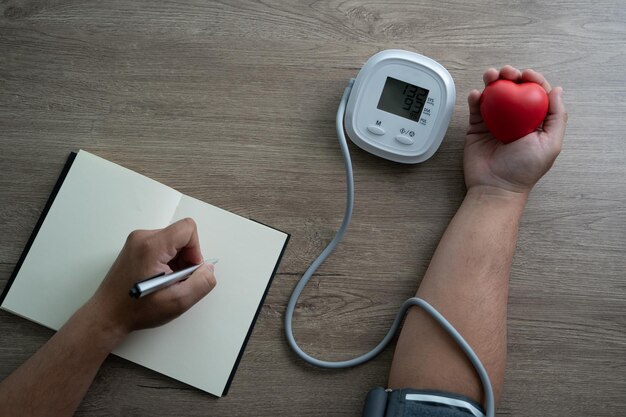Your Guide to When Is Hypertension Dangerous
What You Get:
Free Guide
Free, helpful information about HyperTension FAQ and related When Is Hypertension Dangerous topics.
Helpful Information
Get clear and easy-to-understand details about When Is Hypertension Dangerous topics and resources.
Personalized Offers
Answer a few optional questions to receive offers or information related to HyperTension FAQ. The survey is optional and not required to access your free guide.
Understanding When High Blood Pressure Poses a Threat
Hypertension, commonly known as high blood pressure, is a stealthy condition affecting millions worldwide. While it often presents no symptoms, the consequences of uncontrolled hypertension can be severe. But when does elevated blood pressure transition from being a benign reading to a dangerous health risk?
The Numbers That Matter
While a normal blood pressure reading is considered to be 120/80 mm Hg or lower, values above this threshold start raising eyebrows. Hypertension typically begins at 130/80 mm Hg, and the real danger often becomes more pronounced when readings reach 180/120 mm Hg or higher, an emergency known as a hypertensive crisis. This level of blood pressure demands immediate medical attention, as it significantly increases the risk of heart attack, stroke, and other life-threatening events.
Recognizing the Symptoms of Severe Hypertension
Although most hypertension cases don’t show symptoms, extremely high blood pressure could lead to:
- Severe headaches
- Shortness of breath
- Nosebleeds
- Severe anxiety
- Chest pain
- Vision changes
These could indicate a serious problem needing urgent care.
The Risks of Untreated High Blood Pressure
Uncontrolled hypertension can have dire consequences, including:
- Cardiovascular Diseases: Increases the risk of heart attacks by damaging arteries over time.
- Stroke: Elevates the risk by putting extra pressure on blood vessels in the brain.
- Kidney Damage: Can lead to kidney failure as it weakens blood vessels in the kidneys.
- Vision Loss: Results from damage to the delicate vessels in the eyes.
Managing hypertension is not just about lowering numbers; it’s about safeguarding overall health and longevity. But what if the costs of treatment or lifestyle changes seem daunting? Here, broadening the perspective to explore financial aid and resources can create a pathway to better health and financial security.
Seeking Financial Support for Managing Hypertension
Dealing with high blood pressure involves regular monitoring, medication, and sometimes lifestyle modifications. This can lead to significant medical costs. Fortunately, various resources can ease these financial burdens:
- Government Health Insurance Programs: Programs like Medicaid and Medicare aid in covering medical expenses, including medications for hypertension.
- Pharmaceutical Assistance Programs: Many drug manufacturers offer assistance programs for those unable to afford their prescriptions.
- Community Health Centers: Often provide care based on your income and may offer services at reduced rates.
- Non-Profit Organizations: Some non-profits provide medical assistance and can help cover the costs associated with management and preventive measures.
Proactive Steps for Heart Health
For those navigating the complexities of hypertension, exploring educational resources can also be beneficial. Educational grants are available for health-related studies, allowing individuals or their family members to learn more about public health and preventative care – potentially opening doors to healthcare careers that improve community health literacy.
Key Financial and Educational Resources
- 📋 Medicaid/Medicare: Offers extensive coverage for eligible individuals.
- 💊 Pharmaceutical Programs: Discounts or free medications for qualifying patients.
- 🏥 Community Health Centers: Sliding scale fees based on income.
- 💼 Non-Profit Assistance: Helps with healthcare costs and patient support.
- 🎓 Educational Grants: Provides funding for courses and careers in health fields.
Understanding and managing hypertension is not just a medical necessity but also an opportunity to improve one’s overall quality of life. Access to financial resources can relieve the burden of medical costs, paving the way for a healthier, more assured future.
What You Get:
Free HyperTension FAQ Guide
Free, helpful information about When Is Hypertension Dangerous and related resources.

Helpful Information
Get clear, easy-to-understand details about When Is Hypertension Dangerous topics.

Optional Personalized Offers
Answer a few optional questions to see offers or information related to HyperTension FAQ. Participation is not required to get your free guide.


Discover More
- a 66 Year Old Female With a History Of Hypertension
- Are Eggs Bad For Hypertension
- Are Eggs Good For Hypertension
- Are Endocrine Disorders Causing Hypertension Rare
- Can Adderall Cause Hypertension
- Can Alcohol Cause Hypertension
- Can Allergies Cause Hypertension
- Can Anemci People Get Hypertension
- Can Anemia Cause Hypertension
- Can Antibiotics Cause Hypertension
